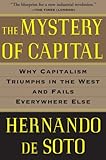I disagree with this reasoning.
As a counterexample I point you to squatters rights. If I live on your land long and openly enough, my unlawful act will confer ownership of the land to me. This principle is not only recognized in our courts, but the clarity that it provides around ownership is a major foundation of our economic system. The reason is that before ownership was clarified with this principle, our land was covered by a mess of overlapping and contradictory claims to ownership of the land. But with a clear owner, however established, that owner can now use their ownership as collateral.
For a book-length treatment of that thesis I point you at https://www.amazon.com/Mystery-Capital-Capitalism-Triumphs-E....
But this decision opens up the legal status of half of Oklahoma for debate, while other tribes around the nation are going to be thinking about which further claims they can now press.
If we continue to open up the course of reversing long-done ills, will we start to ask whether West Virginia should not exist not as an interesting academic question, but as a current legal one? See https://lawprofessors.typepad.com/conlaw/2011/01/west-virgin... for background on that.
Financial assets and intellectual property are not something I can teach you in a comment box. I recommend reading these two books and then we can start the conversation back up again.
http://www.amazon.com/The-Mystery-Capital-Capitalism-Everywh...
http://www.amazon.com/Praise-Commercial-Culture-Tyler-Cowen/...
Tyler Cowen and Hernando de Soto are two economists that are held in incredibly high regard and have done a wonderful job explaining the core concepts of both what constitutes finance and how it applies to intellectual creativity in a market economy.
Cue the knee-jerk rebuttal in 3... 2... 1...
"But the internet changed everything!"
Uh huh, ok, sure, whatever you say... yawn
Hernando de Soto makes a similar case that societies need some cultural achievements unlocked before their market-based economies can work well. Stuff like property rights, fair and impartial courts, contract law, enforced regulatory authority, professional civil servants, etc.
The Mystery of Capital: Why Capitalism Triumphs in the West and Fails Everywhere Else
Hernando de Soto (Author)
http://www.amazon.com/The-Mystery-Capital-Capitalism-Everywh...
I have friends that work in development who criticize de Soto: a good start, but as one would expect, the story isn't that simple. Alas, I don't recall their upgrades to de Soto's insights.
I recently read http://www.amazon.com/The-Mystery-Capital-Capitalism-Everywh... which explains this. The problem arises when the formal property system fails to capture the actual contracts that actual people live by, and makes it unbelievably hard for someone outside of the legal system to get into it. Then you get a situation where people live in houses, but cannot prove their title, and this causes all sorts of complications such as the necessity of bribing government officials (because they are squatters) and the impossibility of getting loans.
By contrast if the formal property system is fixed, you get a situation where professionals can build a house, then sell it to a person who mortgages it, and then pays it off slowly. The overall cost of building the house is less, the quality of the house is better, it simply makes sense to do things right. But this is impossible without formal property because nobody can make money building houses that nobody else can afford, and banks can't lend people that much money without having a way to reclaim property if people fail to pay. So people are stuck building their houses slowly and expensively.
And this is one of a myriad of ways in which it is bad for a country to have the formal property system out of sync with the actual contracts by which people live by.
The theory sounded great, but does it work in practice? Well the country where the author got to try his ideas out was Peru. Looking at http://en.wikipedia.org/wiki/Economy_of_Peru it seems that the lot of the average Peruvian has indeed continued improving since the book was written, so that's reasonable evidence that his theory works.


> In the European tradition, the number 1 thing government protects is private property. There's a reason that deeds are recorded with the county amd that you must pay tax on real estate and that these are fundamental things local government does in even in the most backwater province where they may not even have a library system.
Most (but not all) people who make sweeping statements like the GP's are ideological capitalists, but capitalism fails without the government record-keeping and enforcement systems you bring up:
https://www.amazon.com/Mystery-Capital-Capitalism-Triumphs-E...